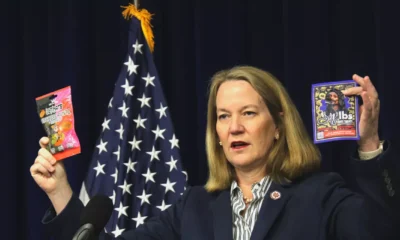abortion access
Democrats Battle GOP Majority to Overturn Arizona’s Abortion Restrictions

On the 52nd anniversary of Roe v. Wade, Arizona Democrats are urging their Republican counterparts to repeal existing anti-abortion laws. They assert that voters desire guaranteed access to abortion rather than additional restrictions.
In a significant shift, 61% of Arizonans backed Proposition 139 last year, which enshrined abortion as a right in the state constitution. This amendment explicitly prohibits any actions that may “deny, restrict or interfere” with a woman’s right to obtain an abortion.
However, dismantling decades’ worth of restrictive laws is not a straightforward process. Legal measures are necessary to address over 50 existing anti-abortion regulations still on the books.
Among these laws is a controversial 15-week gestational ban that lacked exceptions for cases of rape or incest. This ban, which was enforced until last year, is currently under legal challenge after reproductive rights advocates argued it contradicts the voter-approved protections of Prop. 139. Arizona’s Attorney General Kris Mayes, an outspoken supporter of abortion rights, has indicated that enforcement of this gestational ban will not happen while the lawsuit is being resolved. This decision provides crucial legal protection for healthcare providers statewide.
Dr. DeShawn Taylor, who runs Desert Star Institute for Family Planning in the Valley, has resumed performing abortions beyond 15 weeks, bolstered by Mayes’ assurance against prosecution. However, lingering restrictive laws still hinder her ability to offer comprehensive care. She recounted an incident involving a woman who was distressed over her unexpected pregnancy length and initially feared she could not obtain an abortion. Thanks to reassurances from Taylor’s team, the woman could terminate her pregnancy.
Despite feeling secure in ignoring the 15-week law temporarily, Dr. Taylor pointed out that the clinic is still bound by various other regulations, complicating patient care. “The process remains cumbersome,” she noted, emphasizing the necessity for patients to navigate an array of requirements, including returning on a different day for care and mandatory information fees. Additionally, geographic limitations often force patients to travel significant distances since most clinics are concentrated in Phoenix.
Rep. Analise Ortiz, a Democrat from Phoenix and a staunch advocate for reproductive rights, stated the recent election results reflect a clear voter mandate for lawmakers. “The majority of Arizona voters want abortion to be legal and accessible,” she affirmed. “This legislature must recognize that citizens value their freedom and want government to stay out of personal healthcare decisions.”
Despite Ortiz’s call for action, the Republican-led legislature has a history of imposing restrictions on abortion access since the 1980s. The recent expansion of their majority during the 2024 elections complicates prospects for any bipartisan initiatives aimed at improving abortion access.
Some conservative lawmakers are advancing pro-life initiatives that do not directly violate Prop. 139, such as a bill from Tucson Republican Rep. Rachel Keshel that directs Arizona’s Medicaid program to link to resources for agencies supporting women through pregnancy—excluding those offering or referencing abortion services. Simultaneously, Rep. Walt Blackman proposed legislation to prohibit public funding for any organization involved in performing or promoting abortion, while also suggesting grants for pregnancy centers that discourage abortions.
Nevertheless, Democrats continue pushing to abolish restrictions over abortion care. Advocacy organizations signal their intentions to challenge these laws in the courtroom, though this process is costly and protracted. Legislative attempts from Democrats this year include measures to permit abortion consultations via telemedicine, allow mail delivery of the abortion pill, and enable providers to market their services without fear of legal repercussions.
Historically, similar efforts have stalled in the legislature without bipartisan support, and the current climate suggests that trend will persist. To date, none of the proposed bills to ease abortion access have progressed to committee consideration.
On Tuesday, advocates pressed the GOP majority to reconsider their stance on these legislative efforts. Mackenzie Darling, a lawyer from the Arizona Proactive Reproductive Justice Alliance, emphasized the urgency of restoring full access to abortion for the welfare of pregnant Arizonans. “Everyone deserves to make health decisions with dignity and respect,” she asserted.
Rep. Sarah Liguori, also a Democrat, added that ensuring women’s peace of mind regarding their reproductive health is essential. She remarked on the anxiety surrounding pregnancy, which is compounded by the looming fear of legislative interference.
Reproductive rights advocates are wary of potential national policies under the Trump administration that could further restrict abortion access. With a Republican majority in Congress, there’s a growing concern that anti-abortion measures previously blocked by Democrats may be revived, threatening the protections guaranteed by Prop. 139.


















